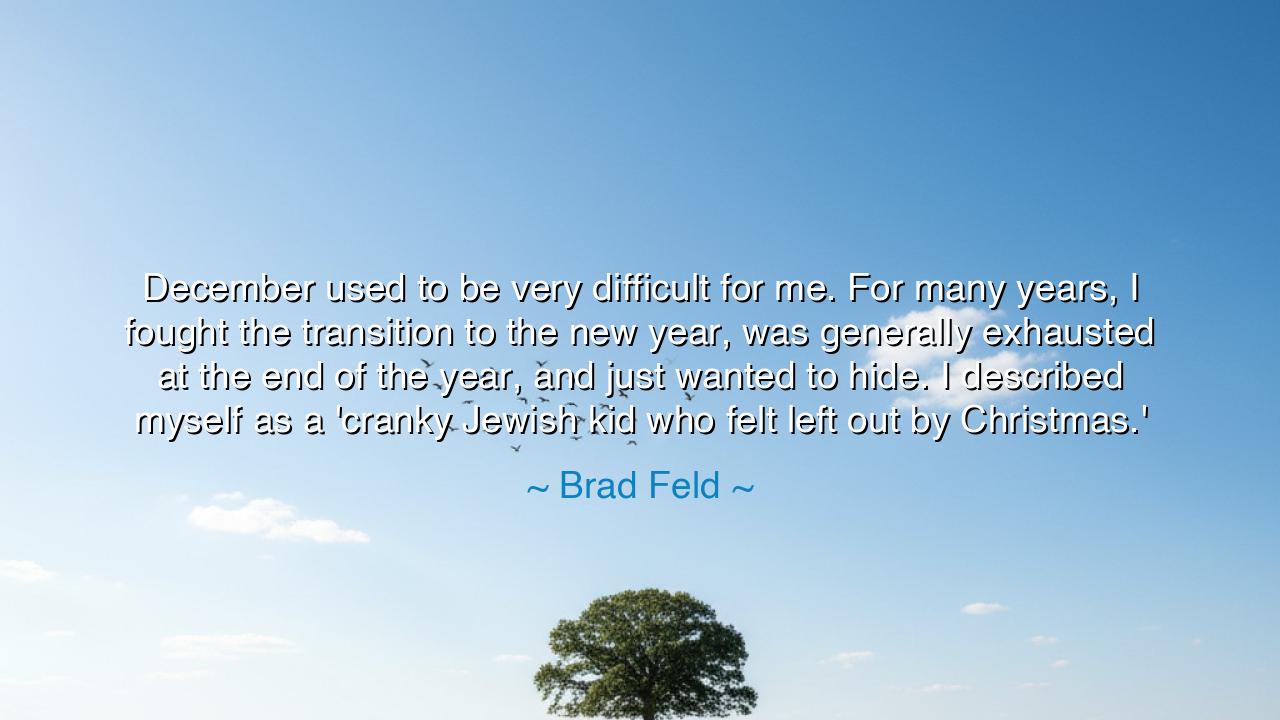
December used to be very difficult for me. For many years, I
December used to be very difficult for me. For many years, I fought the transition to the new year, was generally exhausted at the end of the year, and just wanted to hide. I described myself as a 'cranky Jewish kid who felt left out by Christmas.'






Host: The dim light of the evening stretched across the room, casting soft, gentle shadows as the last traces of the day faded into night. The quiet of the space seemed to match the reflective mood in the air, as Jack sat at the table, turning over the words of Brad Feld in his mind. Jeeny stood near the window, her arms loosely crossed, her gaze lost in the quiet world outside. The quote Jack had shared felt like an invitation to explore something deeper—the difficulties of the holiday season and how they often go unnoticed, especially during a time when expectations run high.
Jeeny: “I was thinking about this quote from Brad Feld: ‘December used to be very difficult for me. For many years, I fought the transition to the new year, was generally exhausted at the end of the year, and just wanted to hide. I described myself as a ‘cranky Jewish kid who felt left out by Christmas.’’ It’s so raw, isn’t it? The idea that the holiday season, which is so often filled with joy for others, can feel like such a burden for some.”
Jack: “Yeah, it really hits home. For so many people, the holidays are this idealized time—family gatherings, joy, celebration. But for Feld, December was a time of exhaustion, of feeling left out and disconnected from the world around him. It’s a reminder that holidays aren’t universally comforting for everyone. For some, it’s a time of reflection on what they don’t have, or on feelings of exclusion.”
Jeeny: “Exactly. And I think what Feld is saying is that the pressure to fit into this idea of holiday joy can be overwhelming. It’s easy to forget that the holidays can be difficult for people who don’t feel like they fit into the narrative. For him, being a ‘cranky Jewish kid’ wasn’t just about not celebrating Christmas—it was about feeling disconnected from the mainstream experience of the season.”
Host: There was a subtle shift in the room, as though the conversation was uncovering something deeper, something that resonated with more than just the holiday season. Jack’s fingers moved slowly over the edge of his coffee cup, as though trying to grasp the deeper implications of the quote.
Jack: “It’s strange, isn’t it? We get so caught up in the festive celebration and the end-of-year excitement, but for many people, the holiday season is a reminder of loneliness, of feeling left out, or of exhaustion from the constant pressure to be happy. Feld speaks to that sense of being excluded, and it’s a reminder that we have to acknowledge everyone’s experience, not just the one we see in the movies.”
Jeeny: “Yes, and there’s something really important in his honesty about the feeling of wanting to ‘hide.’ It’s a vulnerable moment, admitting that the end of the year doesn’t always feel like something to look forward to. Sometimes, it feels like the weight of everything—the pressure, the expectations—becomes too much. It’s a reminder that we don’t have to force ourselves into the mold of holiday cheer if it doesn’t fit.”
Jack: “It’s almost like Feld was battling with the expectations of what the season should be, and his own reality of what it felt like for him. The transition to the new year, that pressure to ‘turn the page’ and start fresh, is exhausting in itself. But when you’re already feeling disconnected or disillusioned, it makes it even harder to embrace the season’s joy.”
Jeeny: “Exactly. And it’s a powerful reminder that emotional complexity should be honored. Just because others are celebrating doesn’t mean everyone feels the same way. It’s okay to have moments of frustration or fatigue or even sadness, especially when there’s so much pressure to be happy. Sometimes, we need to give ourselves permission to just sit with how we feel, without forcing ourselves to feel something we think we ‘should.’”
Host: The conversation seemed to take on a deeper layer, the realization that the holiday season isn’t just about joy and celebration—it’s also about recognizing the complexity of emotions that come with it. The world outside had fully darkened now, the soft glow from the lamp the only light in the room, as if the quietness of the evening had opened up the space for something profound.
Jack: “I think it’s important that Feld spoke so openly about his struggles. It’s not just about December—it’s about how we navigate our emotions in a time when everyone else is celebrating. It’s a reminder that vulnerability isn’t just about showing our ‘best selves,’ but about admitting when we’re feeling overwhelmed, tired, or out of place.”
Jeeny: “Yes, and it’s the act of acknowledging that struggle that makes us human. Feld doesn’t shy away from his feelings of being left out—he owns them, and that’s powerful. Maybe it’s okay to feel a little ‘cranky’ or worn out during the holidays. Maybe it’s okay to not fit the picture-perfect idea of holiday cheer.”
Host: The room was quiet now, the space between them filled with a new understanding. The idea that holidays and new beginnings aren’t always easy for everyone—that sometimes, the best thing we can do is acknowledge those feelings without judgment—settled in the air like a quiet truth. The evening outside had grown darker, but inside, there was a lightness, a sense of peace that came from embracing all parts of the holiday experience, even the parts that were difficult to face.






AAdministratorAdministrator
Welcome, honored guests. Please leave a comment, we will respond soon